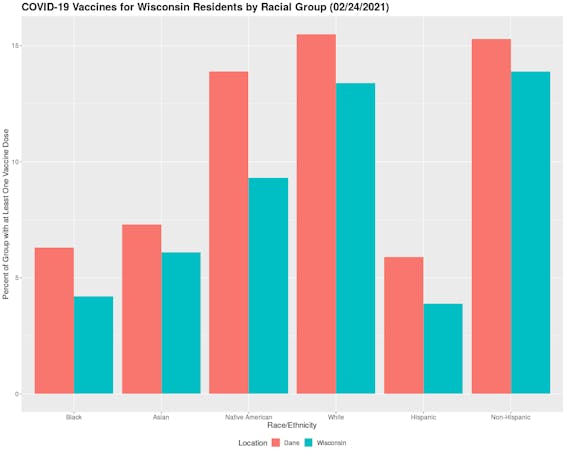As Wisconsin reaches over 1.2 million COVID-19 vaccinations distributed, statistics show racial disparities in who has access to the doses.
Data shows that the percentage of the white population that has received at least one dose is just over three times the rate of the Black population. Just over thirteen percent white people have received at least one dose as compared to 4.2 percent of Black people.
Data at the Dane County level shows similar disparities. DHS data shows that 15.5 percent of white people and 6.5 percent of Black people have received at least one dose. Eleven percent of records reported unknown race and 4.3 percent were recorded as “other.”

Wisconsin Department of Health Services (DHS) data shows that white, non-Hispanic, females and people over 65 are the groups that have had the most of their population receive at least one dose.
On the state level, Black Wisconsinites have the lowest percentage of having received at least one dose as a percentage of population.
The DHS dashboard includes a disclaimer that demographic information like sex, race and ethnicity are not required to be reported in the Wisconsin Immunization Registry.
WIR cannot store multiple race variables for a single vaccination record, regardless of how many are reported. Demographic breakdown will be “incomplete and imprecise.”
Eight percent of records had an unknown race and 4.6 percent of records are reported as “other” races.
State officials responded to racial disparities last week by investing $6.1 million to support community-based organizations that raise awareness and access to vaccines among communities that have “faced both historical and current barriers to health care services and the COVID-19 vaccine.”
“COVID-19 vaccines are available in hundreds of places around the state every day, but people without easy access to the internet, or without an existing relationship with a healthcare provider may not be aware of how to get vaccinated when they are eligible,” DHS Interim Secretary Karen Timberlake said. “We also know that some people may not trust information about the COVID-19 vaccine due to a history of racism and mistreatment experienced by many communities.”
The DHS website says that Wisconsin is “deliberate choices to reduce barriers to access the COVID-19 vaccine.
“Systemic barriers and social factors including access to quality health care, housing, transportation, and job opportunities, often referred to as systemic racism, has exacerbated the disparate impacts of COVID-19 experienced by Black, Brown, Indigenous and other communities of color in Wisconsin, including disparities in vaccine rates,” the DHS site reads.
New community vaccination clinics announced by the state, including the one in nearby Rock County, are focusing on vaccinating people without health insurance.
The Daily Cardinal previously reported on the disproportionate impact of COVID-19 on BIPOC communities. The disparities are related to structural racism, unequal access to health care and prevalence in frontline occupations.
Wendi C. Thomas and Hannah Grabenstein from ProPublica reported that there may be a less obvious bias against Black people when it comes to vaccine eligibility.
They noted that the blanket age standard ignores previous research done by the Brookings Institute which found that Black people are dying from COVID-19 on average 10 years younger than white people.
“If you’re trying to avert deaths, you would want to vaccinate Blacks who are about 10 years younger than whites,” Sara Reber, co-author of the Brookings Institute research, said.
The ProPublica article also indicated that studies have found that overall life expectancies are lower for the Black population than the white population and that the age standard is not promoting racial equity.
Life expectancy dropped by a full year in the first half of 2020, but dropped by three years for non-Hispanic Black males and just over two years for non-Hispanic Black females, PBS reported.
Current eligibility in Wisconsin includes adults age 65 and older, while some other states are vaccinating adults age 75 and older. Other eligible groups include frontline health care workers, nursing facility residents and staff, and first responders.
More groups will become eligible in early March, including teachers, some public-facing essential workers and non-frontline essential health care workers.






